2014 Adobe Offsetting: Year in review
Over the past year I’ve learned a lot about supporting technology. Whether it’s online content, software, or hardware; monetarily supporting services helps further future development. It keeps the developers fed and happy. If you believe that a certain program could be the next big painting application, back it any way you can. If you can’t afford to give money, give your time. Answer questions on the software’s forum, share your work online, or tweet your undying love. It’s our responsibility as users to hit the streets with our work and our knowledge, sharing our experience. This grows the user base and makes for a larger and stronger community. If you can give money also, all the better.
Hate is a strong word
When people have spoken to me about this blog, they want to discuss why I hate Adobe. The fact is that I don’t hate Adobe. What I dislike is that we as users have given them control to dictate the terms of our relationship with their subscription model. Personally, I don’t want to give any company control over my work, making me forever tied to paying a stipend for accessing my content.
Adobe has been friendly to artists over the years. They bundled software from acquisitions of other companies like Aldus Pagemaker and Macromedia, rolling their software into one integrated solution. While Adobe was doing this, none of us noticed that they were making a monopoly with this convenient and cheap software eco system. Now with all of the industry-standard software obtained, they hold the cards.
David vs. Goliath
After Adobe announced its moving to a subscription-only service in May of 2013, smaller companies and open-source developers have been pushing themselves like never before. Developers have been working feverishly over the past year developing tools or improving existing open-source products in order to compete against Adobe.
As a result, there have been big strides with open-source software, like Krita. Earlier this year they guaranteed rolling updates with the introduction of their Kickstarter. Since then Krita has been going through a long list of fixes and improvements to become a leader in digital painting. Their fixes include Liquify, Cage Transform, speed improvements, and Perspective Transformation. They’re also working a lot on Photoshop integration so that you can work between the two programs without any issues. It’s really inspiring to see all this work in such a short period of time and it’s exciting to see what’s in store.
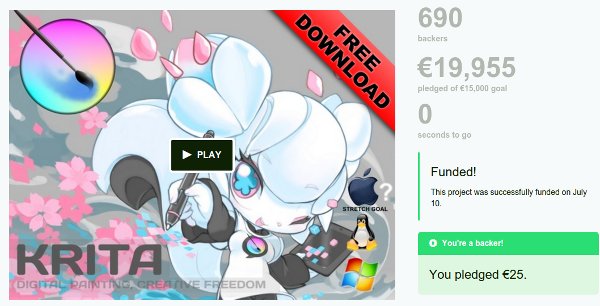
All open-source software has been looking for money over the past year. Software like Blender and Tupi were less successful than Krita at reaching their funding goals. The message that they’re sending to users is that they need our help.
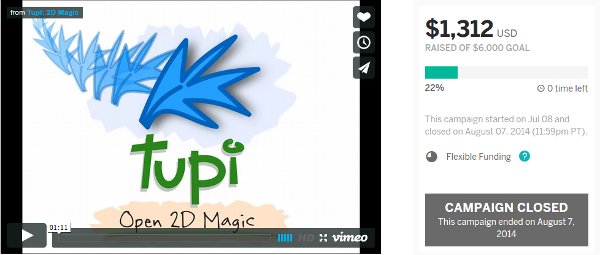
Free-ish
Before beginning my monthly offsetting, I thought of open source like many others—that it’s freeware. What I learned in speaking more with developers is that open does not mean free. In order to have open software and content, we need to give back with time, money, or both. Through this past year I’ve developed a lot of wonderful friendships and gotten to know the people who develop and maintain much of the open software that I love.
Support developers
Developers are quick to point out that in order for them to be successful, they need to engage in an ongoing conversation with their community. Many artists have their thinking backwards. The misconception that open source is too infantile and not ready for daily use is the wrong way to think about it. You can’t wait for the perfect software that meets all your needs to fall at your feet.
Trying out software and starting a conversation about your experience with developers helps resolve many performance issues. One of my developer friends likened it to expecting a baby without the work of conception. Developers know code, but they don’t fully understand your process as an artist. Communicating with developers helps them understand what’s important to users as they tailor their development to fit your needs.
A world outside open source
That’s not to say that you shouldn’t support other smaller companies that are trying to develop a great set of tools. One piece of software that I absolutely love is Anime Studio. Even though it’s now distributed by Smith Micro instead of independently, the original developer, Mike, is still the vision for this super animation tool. They pack the software full of updates and make them available almost twice a year. There are plenty of software options like Anime Studio out there that are great tool and wonderful alternatives to using Adobe.

Contributions
In the past year, I’ve donated over $500 USD to software, developers, and visionaries. I’ve supported open-source software, independent projects, inventions, and sites that provide wonderful content. Sharing my experiences and discoveries over the past 12 months have helped others who are looking for alternatives and new things to try.
Helping others isn’t always an altruistic act, and that’s not a bad thing. I’ve learned that individuals can make a difference. Giving time, energy and a few bucks can lend to making your dreams possible. The thing is that you have to start somewhere. I feel that my money and time has gone to a good cause—me. Supporting alternatives has gotten me closer to living in an Adobe-free environment.
I still use Adobe for my day job, but at home I no longer use any of the programs. My iMac has become a very large iPod that plays my iTunes collection while I work in Linux. The past year hasn’t been easy but it gets better with each passing day. I’m looking forward to 2015 and continuing my commitment to Adobe offsetting.

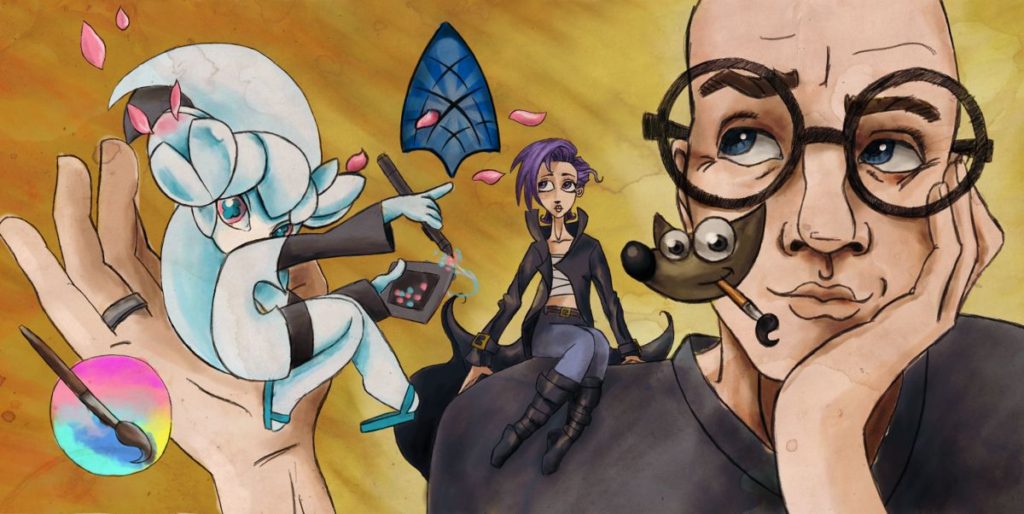

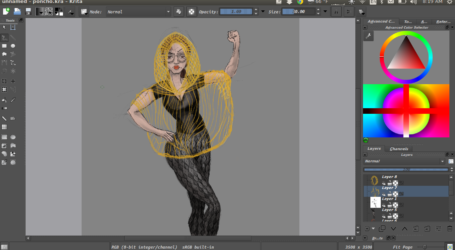
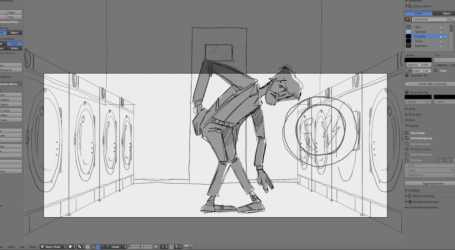

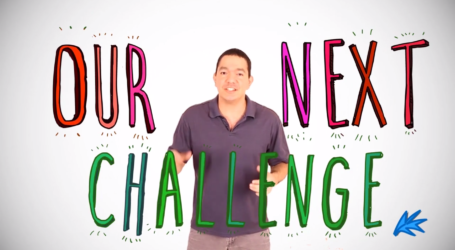
Thanks so much for publicly posting about your discomfort with Adobe’s push to the cloud. I made my permanent switch from Adobe products while doing some smaller design work as a graduate student. I really appreciate the idea of Adobe Offsetting and hope others join you. I’ve donated infrequently in the past, but my experience with free/libre software is that the developers are approachable and open, especially with art tools.
Thanks so much for sharing. Really looking forward to following your work in 2015.
Thanks so much for your encouragement! Think about contributing any way you can! 🙂
Thanks for sharing this, Krita is doing great!
Just one note – Blender Foundation or Blender Institute never did a Kickstarter or Indiegogo campaign. We do our own (crowd)funding since 2002 independently on blender.org, and that’s always been successful.
Last year’s Open Movie fundraiser, the donations, sponsors, subsidies and monthly subscriptions give enough income to have 8-10 developers work on Blender.
The target Blender Institute didn’t meet was to get funding for a feature film. This then was restructured to a smaller film project, which happily commences and gets released July next year.
Ton! Thanks for for the clarification;)
Thanks for this nice read! I have switched about 3 years ago from windows/photoshop to Linux/krita and i never regret this decision. It´s still an ongoing positive learning experience, that opened a lot of doors to me, and changed how i think about IT and software developement. I still use win and ps occassionally – it´s like my left hand – i need it, but the right hand (linux) does most work 10 times better 😛 When i now look back how things developed in the digital side of our (my) life in the past last year, than i would say, that the ideas and the community behind opensource have become even more important for personal security, freedom of choices and social networking. (at least for me..)
It’s great to hear that there are others like me out there! The thing that I love about Linux and open source is that companies don’t decide if your relationship with their software is over. I can’t tell you how many times companies discontinue products but at the same time don’t open up the technology for further development. Apple’s one of the worst offenders of this. Apple acquired Shake to only discontinue the software a few years later. I used to keep all my freelance scheduling on my Mac Calendar which seemed harmless, until the day I was notified that the Calendar app would no longer function on my computer. Until I upgraded, I could only see my calendar online through my .mac account. It made billing super difficult until I upgraded. It was then that I decided to not let a company control my info and started looking for alternatives. Good luck and I look forward to reading your blog! —S:)